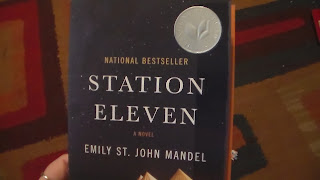Being Human
Yesterday I attended a book discussion over the book Station Eleven by Emily St. John Mandel.
One of conversations we had as a part of our discussion entailed the importance of being human. This particular novel is post-apocalyptic. A flu has spread throughout civilization. Few people remain on earth. Earth has lost things we value most - electricity, the internet, fast food restaurants, Wal-Mart, firearms. Homes have been raided for necessary needs. People take sanctuary in large buildings, forming villages.
There are, however, people who see the need to preserve their humanity. Some travel, performing Shakespearean plays. Another forms a museum of civilization, displaying now-useless items such as cell phones and video games and high heeled shoes. Another writes a newspaper, interviewing people who were alive before the flu devastated.
I have been having a lot of conversations lately about what is important in life. So many people ask me how I can do the things I do - work, family, homeschooling, college, plus extra activities like Bible studies and prison ministries and housechurching and book discussions and writers' groups. I try to choose my answer carefully. I generally tell people that if I were to only work and eat and sleep, I would become depressed. I can function on lack of sleep for the most part. I cannot function on lack of life.
The book discussion yesterday really put some things in perspective for me. Work does not make us human. Money and gadgets do not make us human. Sleep does not make us human. What makes us human is our relationships. What makes us human is art and literature and whatever else interests us. Our passions make us human. Our talents make us human. There are needs we have outside of the physical that makes us human. Emotional needs. Needs for expression and intimacy and discussion and music and socializing. Needs to have someone else get us.
If you have not read Station Eleven, I definitely recommend it. When I originally read it, I thought about why I like it. I'm generally not into post-apocalyptic literature. But this one makes connections. It shows how people are connected and events are connected. But now that I think about it more, I think another reason I enjoyed this book is the fact that it shows our definitions of success are not what is important humanly speaking. There is so much more to living life.
One of conversations we had as a part of our discussion entailed the importance of being human. This particular novel is post-apocalyptic. A flu has spread throughout civilization. Few people remain on earth. Earth has lost things we value most - electricity, the internet, fast food restaurants, Wal-Mart, firearms. Homes have been raided for necessary needs. People take sanctuary in large buildings, forming villages.
There are, however, people who see the need to preserve their humanity. Some travel, performing Shakespearean plays. Another forms a museum of civilization, displaying now-useless items such as cell phones and video games and high heeled shoes. Another writes a newspaper, interviewing people who were alive before the flu devastated.
I have been having a lot of conversations lately about what is important in life. So many people ask me how I can do the things I do - work, family, homeschooling, college, plus extra activities like Bible studies and prison ministries and housechurching and book discussions and writers' groups. I try to choose my answer carefully. I generally tell people that if I were to only work and eat and sleep, I would become depressed. I can function on lack of sleep for the most part. I cannot function on lack of life.
The book discussion yesterday really put some things in perspective for me. Work does not make us human. Money and gadgets do not make us human. Sleep does not make us human. What makes us human is our relationships. What makes us human is art and literature and whatever else interests us. Our passions make us human. Our talents make us human. There are needs we have outside of the physical that makes us human. Emotional needs. Needs for expression and intimacy and discussion and music and socializing. Needs to have someone else get us.
If you have not read Station Eleven, I definitely recommend it. When I originally read it, I thought about why I like it. I'm generally not into post-apocalyptic literature. But this one makes connections. It shows how people are connected and events are connected. But now that I think about it more, I think another reason I enjoyed this book is the fact that it shows our definitions of success are not what is important humanly speaking. There is so much more to living life.


Comments
Post a Comment